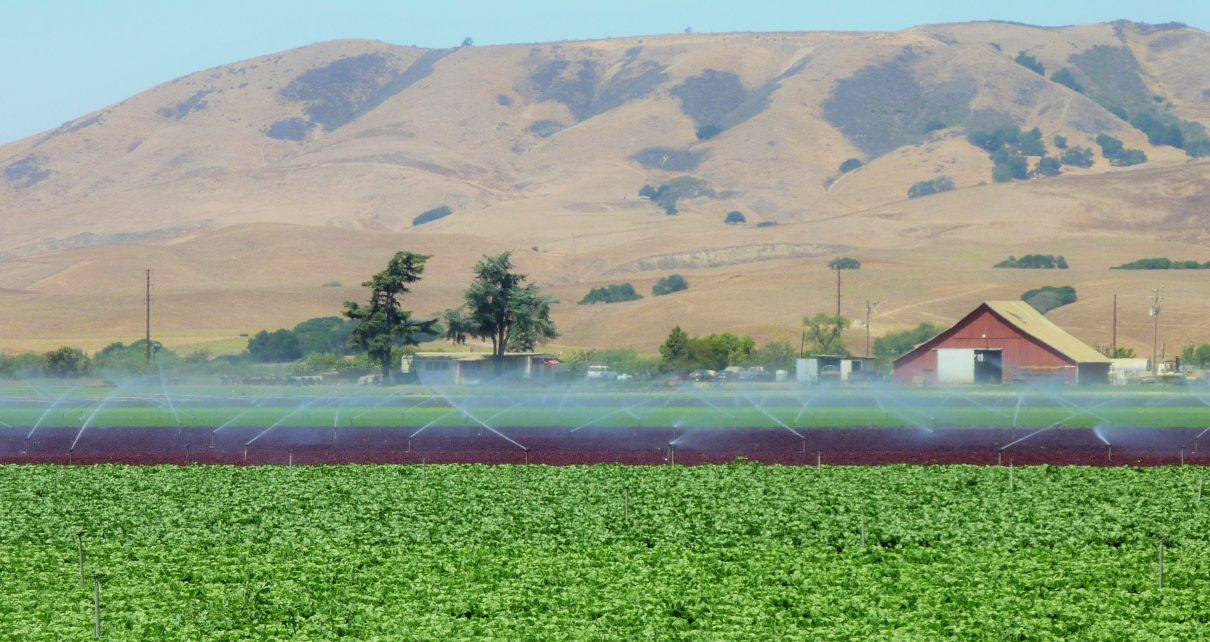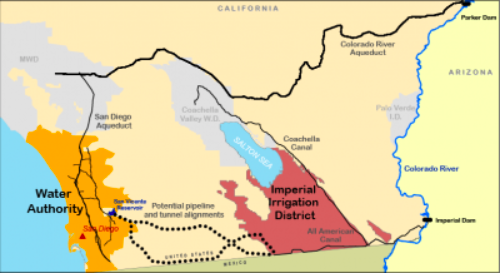
California farming. (Photo: CA Dept. of Conservation)
With Water Cut to Rice Growers, Colusa County Asks for Economic Assistance
‘The budget surplus should go to a rainy day fund, but how about the day it doesn’t rain?’
By Katy Grimes, May 27, 2022 7:17 am
Colusa County in Northern California is the top producer of rice in the Sacramento Valley. Colusa County historically produces more than 150,000 acres of rice in a normal year. But in 2022, Colusa officials say they will only be able to produce a fraction of their usual rice crop, costing rice farmers, workers and suppliers hundreds of millions of dollars.
“In April 2022, the water districts serving Colusa County were given their final allocation for the 2022 growing season – 0.4-acre feet per acre,” Colusa County officials said in a statement. “This allocation is not enough to support rice production, and estimates show that the Sacramento Valley will fallow 370,000 of 450,000 acres in the Sacramento River Settlement Contractors service area, primarily in Colusa and Glenn Counties. Currently, less than 7,000 acres are estimated to be planted in Colusa County, resulting in a direct financial loss to growers in excess of $270 million.”
The first 50% of California’s water flows out to the Pacific Ocean for fish and environmental purposes – something the Public Policy Institute of California verified in 2019: “Water in California is shared across three main sectors. Statewide, average water use is roughly 50% environmental, 40% agricultural, and 10% urban.”
Colusa County officials hosted a legislative tour and informative briefing for Assemblywoman Cecilia Aguiar-Curry (D-Winters), “highlighting the crisis-level economic impacts resulting from the unprecedented drought and winter freeze.”
“The event concluded with a request for local assistance.”
The Globe spoke with Colusa County Administrator Wendy Tyler about the meeting with Assemblywoman Aguiar-Curry, and what the county is facing this year after the February Freeze and latest water allocation cuts.
Tyler said their meeting and message was “very well received,” and noted that the Assemblywoman has an agriculture background and understands their plight.
Tyler described the devastation of the county’s agriculture industry similar to what Covid lockdowns did to businesses in urban cities. “We need a payroll protection plan and rental assistance,” Tyler said. “We have the third largest farm worker housing in the state. Thousands of people come to Colusa County every season, and work with Colusa County’s own people. Their children go to Colusa schools, so when they aren’t here it impacts our ADA.”
She said when growers can’t plant, suppliers are hurt – everyone from equipment suppliers to the people who make the bags for farm products. Specifically, this also impacts mills, aerial applicators, crop dusters, pesticide and fertilizer dealers, and ground applicators.
“The economic devastation is unprecedented,” Tyler said. “People aren’t dying, but businesses and communities are.”
California ranks as the second-largest rice-growing state in the United States. “California rice is highly prized all over the world—particularly in Asia and the Middle East. In 2019, more than 498,000 acres of rice were planted on 1,100 farms, Think Rice reports. Rice production contributes more than $775 million to the state economy.”
In addition to the drought and water crisis, Tyler said in February Colusa County and much of the Sacramento Valley experienced a devastating freeze, resulting in a 74 percent loss of local almond crops. The estimated direct financial loss to growers is nearly $210 million. Tyler said the impacts are felt by businesses related to growing almonds, dryers and processors, and added that growers are concerned about future labor shortages.
Tyler said they spoke with Assemblywoman Aguiar-Curry about receiving economic help, “especially going into the budget with the $86 billion budget surplus.”
Colusa County’s request of Assemblywoman Aguiar-Curry’s office is for an economic bridge to support and assist the industry through this crisis. Without assistance, Colusa County officials say generations of local heritage and their place in the global market are at risk. They say it is critical that the State develop and deploy local programs to help assist the industry through this historic crisis.
Tyler added, “The budget surplus should go to a rainy day fund, but how about the day it doesn’t rain?”
- Steve Hilton Show: Newsom Proposes Tax Credits for Hollywood, Shirks Other Industries - October 30, 2024
- How to Kill a State in 5 Easy Steps: Gavin Newsom’s California - October 29, 2024
- Gov. Newsom Gifts Tax Breaks to La La Land, Betting on the Losers - October 28, 2024





The greenies ran the lumber industry out of California now there going to run the rice growers out of the state!
Do these environmentalist zealots have that much money to buy ALL of the leadership in this state?
Good work Katy, keep their feet to the fire!
Isn’t running the lumber industry out of CA one of the reasons we have such large forest fires?
Rice is a huge grain crop. Not good.
Uh, it would be nice if the governor and the legislative Dems wouldn’t cause an economic problem —- with their punitive and absurd water policies —- for rice growers and others in the FIRST place, rather than having to pick up the pieces after growers find themselves impoverished and having to come hat in hand to the government for relief. But that’s how the Dems roll, isn’t it? Putting honest farmers and citizens in an untenable position through the politicians’ own policies so that hard-working people have to depend on the government to live? And correct me if I’m wrong, but hasn’t Asm Aguiar-Curry’s name been on just about every wacky piece of legislation we’ve seen lately? So at least I don’t have to waste time researching her to find out what her part likely was in this mess the farmers find themselves in.
By the way, farmers aren’t like other put-upon Californians who are able to move to more friendly states. Farmers, for many reasons, can’t so easily just pick up and go elsewhere. It’s really unforgivable what this punitive state has done to farmers whose families have been here for generations. And for what, exactly?
As far as the role of environmentalists in the economic troubles of farmers, didn’t we just learn that the greenies are A-OK with rice farming due to the wetlands that are created by farmers flooding the fields in the off-season? They like wetlands, don’t they, and the many birds that are attracted by them? Did I miss something? If not, it seems to be just one more example of how the greenies run into themselves and each other and make themselves an out-of-touch laughing stock with their contradictory wishes.
Why should California divert 80% of its available water to rice and alfalfa crops? That’s insane in a desert.
I would bet the Nancy’s and Gavin’s pools are full!
Oh YEAH ——- count on it.
Wonder is the wineries in Napa like Plumpjack have had their water cut?
JF62: Gee, I think I’ll put all my money on “NO.” His past behavior is evidence.
As I recall, Gruesome’s PlumpJack properties were an exception during Covid and stayed open for business. I think other wineries in the north stayed open too.
And don’t forget that Gruesome’s one-time home of Marin County was made an exception to state affordable housing mandates. He was Lt Gov at the time this happened. And the Marin County exemption was such that it was extended to 2028; thus at the same time Gruesome as Governor was punitively and vengefully suing and going after Huntington Beach for not following state A.H. mandates (even though Huntington Beach WAS), his town of Marin was exempted. Amazing, isn’t it. And not in a good way.
This was covered in 2019 in The Globe by Katy Grimes:
https://californiaglobe.com/articles/huntington-beach-sued-while-marin-county-exempted-from-affordable-housing-requirements/
The public policy decision to support water intensive crops like rice in what is basically a desert is insane, particularly with the population growth of the state. Rice, alfalfa, and similar crops can be grown in regions with far more water. Not in California.